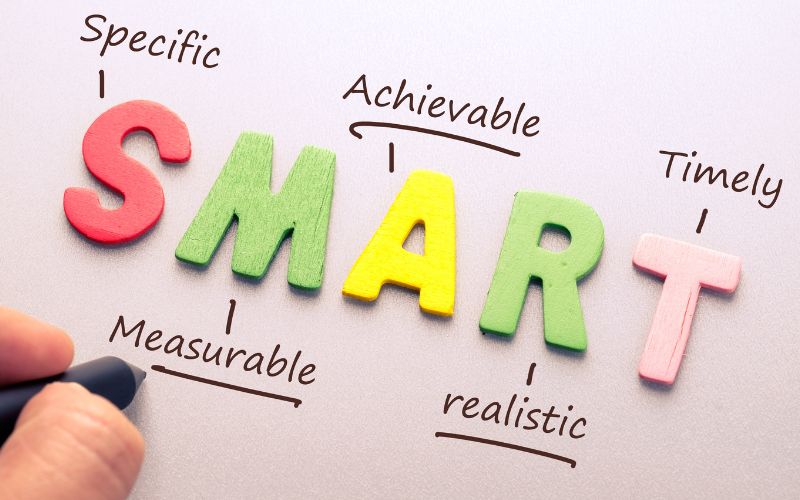How do I set personal goals? How can I achieve the goals I set? Why do people fail to achieve their personal goals?
Towards the end of a year and the beginning of a new one, it is a common tradition for people to set resolutions for the upcoming year. This is also the time when most people plan to make major life changes. However, most people end up frustrated and discouraged when the goals are not met or seem too difficult to meet.
To be able to set goals and achieve them, you have to learn how to set proper personal goals and the smaller steps to take to actualize the big goals.
Hi, I am Katie Lister, a practicing Registered Nurse and founder of Growth Gals. In this article, I will tell you everything you need to know about setting personal goals and achieving them.
Table of Contents

Katie Lister
What are Personal Goals?
We desire and hope to achieve personal goals within our set time frame. These personal development goals could either be long or short-term. They could be related to your lifestyle, work, or family life. Setting goals helps you to develop yourself. Start yourself off with achievable goals in the short term that you can use as a stepping stone to long-term goals.
Examples of personal goals include:
- Becoming a more active listener
- Establishing a positive daily routine
- Reading more books
- Becoming more empathetic
- Learning new skills
- Maintaining a perfect work-life balance
- Improve communication skills
- Bettering your physical health
- Improving your leadership skills
- Improving time management skills
To achieve your goals, you must be intentional and commit yourself to achieving each one of them. One of the most common mistakes is setting unrealistic goals in all areas of your life, making success impossible. This article will tell you everything you need to know about personal goals and how to set attainable ones every time.
Find more personal development resources here.
Setting SMART Personal Goals
“The trouble with not having a goal is that you can spend your life running up and down the field and never score.” Bill Copeland
Why should you set personal goals, and how should you go about them? Setting goals is easy to do. However, the goals should be realistic. It’s easy to say that you will learn ten languages in a year, but is that possible?
You can set any goals, but strategy to achieving these goals is key. You must start by identifying your passion and visualizing what you want for your life. This visualization makes it easier to identify realistic long and short-term goals.
One of the best ways to set yourself up for success is to use the SMART acronym. SMART stands for:
1. S- Specific
To achieve your goals, you must be specific. You must answer questions like:
- What do I need to achieve?
- What steps do I need to take to achieve these goals?
For instance, you could decide to learn a new skill like computer programming. To do so, you need to find out what short term goals you need to set to achieve the long term goal. Will you study online or attend physical classes? What must you do to start this new skill, such as enrolling and paying for it? Do you have the funds, or do you need to take a student loan?

2. M- Measurable
Ensure your goals are measurable or quantifiable, making it easier to track how far you have come and how much further you need to go. Measuring personal goals can be tricky unless you develop a system that allows you to measure and track them.
For instance, you might lose 30lbs within twelve months. Further, break that down and ensure you lose 2.5 lbs. every month, and measure your weight loss progress against that ideal.
3. A-Attainable
You must ensure you stay strong and achieve these set goals. Your goals must be realistic and attainable. For instance, if it takes you a year to learn a new skill to perfection, you should only imagine that you can learn some things in one month.
The beauty of personal goals is that you are the author of your goals. You can set your terms and make it easier to achieve these goals.
4. R- Relevant
Personal goals should improve your life and thus be relevant to your lifestyle. It would help if you were very realistic while choosing these goals. Consider your life purpose and what you want to do in the future. It does not make sense to set a goal to study nursing when you know your passion is art.
5. T- Time Bound
You should set a specific timeline for yourself to increase accountability. Without a deadline, you may not feel responsible for improving your productivity at work. Have a to-do list from the get-go and ensure you follow it.
What is The Most Important Step in Prioritizing Goals? Find out in this article.
Examples of SMART Goals
Some examples of SMART personal goals may include:
1) Training for a marathon
Specific: I would to start training 6 days a week for the 2024 Boston Marathon
Measurable: I will make use of a fitness coach to track my progress and improve speed
Attainable: I already ran and finished two half marathons in 2023 and I am fit enough to proceed
Relevant: I love running and have been running competitively since high school, so I know a lot about running marathons.
Time-bound:
The marathon is in April 2024, so I must ensure I am well prepared by then.
2) Starting a side business
Specific: I will start a small side business of selling cakes and cookies from my kitchen
Measurable: I will spare one hour per day marketing my products on social media
Attainable: I used to make cookies and cakes with my mother to raise money for charity, so I am well equipped to run the business.
Relevant: I love baking and it gives me great pleasure when people enjoy my baked products. It will be an easy way to make some extra money.
Time-bound: I will immediately start writing down my marketing plans and be ready by summer 2024.
Benefits of Setting Personal Goals
There are numerous benefits to setting personal goals, even if you do not achieve them within the expected timeframe. The discipline of sticking to a schedule can greatly enhance your life. Edwin Locke, a researcher, found that people who set challenging life goals performed much better than people who set easy and general goals.

Why is it important to set realistic goals? Some of the benefits of goal setting include:
· Personal goals provide Direction and Motivation
Setting personal goals gives you clear direction within a specified timeframe. Without clear direction, you may be drifting through life, keeping busy but never accomplishing anything substantial. When you know what you need to achieve, you feel more motivated whenever you achieve a goal.
· Clarity
Setting goals can help you gain clarity of thought and become a better decision-maker. It allows you to make better decisions that align with your end goals while ignoring things that do not help you reach your desired objectives.
· Personal Goals Motivate You
Goals provide you with a sense of purpose and drive. They act as a source of motivation that keeps you going forward. Every day, you take a step closer to achieving your goals, whether long-term or short-term.
Life can become more varied and fulfilling with something to look forward to. For instance, if you’re learning new skills that could lead to a promotion, you’re more likely to work harder and stay motivated until you achieve your goal.
Types of Goals
There are two types of goals – long-term and short-term.
· Long-term Goals
Long-term goals are big goals that take longer to accomplish. These goals are often:
- Fitness goals
- Health goals
- Financial goals
- Relationship goals
- Career goals
- Professional growth
Setting specific goals to achieve desired results within a set timeframe, such as learning a new language, losing weight, purchasing a home, or planning a wedding, is important.
However, to achieve these long-term goals, you must set smaller goals to guide you towards the bigger milestones.
Short Term Goals
Once you set a long-term goal, you must set short-term goals to help you achieve the longer-term ones. For this reason, small goals are known as process goals. Daily or weekly goals help to keep you accountable and sufficiently motivated.
When you follow through on each of the smaller goals, you will easily achieve the short-term goals. For instance, if you plan on losing 30lbs within a year, your weekly goals might include:
- Going to the gym five days a week
- Eating healthy all week
- Allowing a cheat day once a week
- Take brisk half an hour walks
You can break these goals down into daily goals, such as:
- Attend the gym for one and a half hours tomorrow
- Take a brisk walk to work tomorrow morning
- Meet with the nutritionist tomorrow
- Read two chapters of a particular book
Successful individuals, such as entrepreneurs and top athletes, always set goals for themselves. This helps them stay motivated and focused on their ultimate accomplishment. When you have clearly defined goals, measuring your achievements and building your self-confidence becomes easier.
Here are relevant goal setting questions to ask in the process of setting personal goals.
How to Set Personal Goals
Setting goals is a process that starts with careful planning plus some hard work. There are a few steps that you can follow to get the best results or set goals for personal growth at work, personal development, and personal life.

Setting goals is a process that starts with careful planning plus some hard work. There are a few steps that you can follow to get the best results or set goals for personal growth at work, personal development, and personal life.
Write Down Your Goals
It is important to write down specific goals and create a plan with a timeline to achieve them. Instead of saying, “I want to read more books,” be more specific and say, “I will read two books a month.”
Break down the amount of time you will dedicate to reading each day or the number of pages you read daily. Write down your plans and keep them on record so you can easily refer to them when needed. Most people fail because they need something that keeps them accountable. Written records force you to account for your time and measure how far you have come.
Set Motivating Goals
Personal goals are supposed to motivate you to improve your life. It would defeat the purpose if they were not important to you. Achieving the goal will be irrelevant if the outcome means little to you. The key to achieving the set goals is motivation.
To achieve your goals, aligning them with your life priorities is crucial. It’s easy to get overwhelmed with too many goals, leading to a lack of motivation and ultimately achieving none.
As the saying goes, it’s better to be a master of one trade than a Jack of all trades but a master of none. Don’t let obstacles stop you from achieving your goals. Instead, challenge yourself with an undefeatable attitude that allows you to power through any hurdle. With this mindset, you’ll be unstoppable in reaching your objectives.
Set SMART Goals
As previously mentioned, SMART goals are effective for setting your personal goals. By making sure that your personal goals are SMART (Specific, Measurable, Achievable, and Time-bound), you guarantee that whatever you set out to do will be a success within the established boundaries.
Have an Action Plan
Most people often need to pay more attention to this step while setting goals and focus on the result instead of the process. You must make a to-do list of all the steps you must follow. Cross off each step or goal as you complete it, which allows you to see your progress and how far you are from the ultimate goal. This step is crucial, especially for long-term goals. However, there is no specific template; your goals are relative to your personality, lifestyle, and what you want to achieve.
Learn New Skills
Learning new skills is important, especially if you’re aiming for management positions. Public speaking is one such skill that can come in handy. Depending on your professional goals, you can also learn new computer programming language and website-building skills that will elevate your resume.
You can learn new skills or build on what you already know. For some people, there is always time to change careers, and they may decide to learn new skills unrelated to their current career.
Stick to the Plan!
Setting goals is not a one-off affair but a lifestyle change to improve your life and well-being. As you achieve your goals, you keep setting more goals, making it crucial to stick to the plan. Ensure you have in-built reminders that ensure you stay on track. Plan for regular goal reviews to check on your goal progress. The action plan may change, even if the long-term outcome remains.
Growth Gals Can Help with Setting Personal Goals!
Growth Gals is a welcoming community of women interested in becoming the best versions of themselves while achieving all their personal goals. The community promotes positive change by helping individuals discover their true selves, values, and aspirations.
Through intentional goal setting, Growth Gals assists women in overcoming their obstacles and reaching their goals. You can follow @growthgals_ on Instagram for updates on future offerings, such as goal-setting journals, coaching, and support groups, and stay tuned for their upcoming newsletter!
Conclusion
Sometimes, we all feel we need to achieve more, no matter how busy we are. Goal setting is one of the ways we ensure we reach our desired objectives.
You can either set long-term or short-term goals. However, the short-term goals are typically shorter objectives that lead up to the long-term goals. To set goals with the desired outcome, you must set SMART goals and have a solid action plan for achieving your goals.
Joining a community of like-minded women like Growth Gals will give you the much-needed support to set and achieve your professional development, whether long or short-term. Make next year count!


